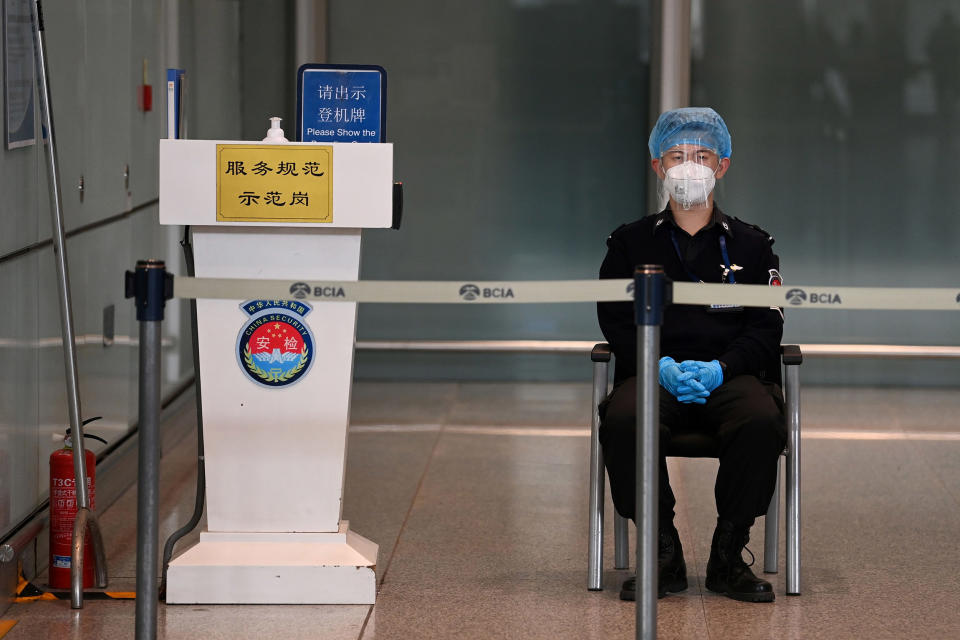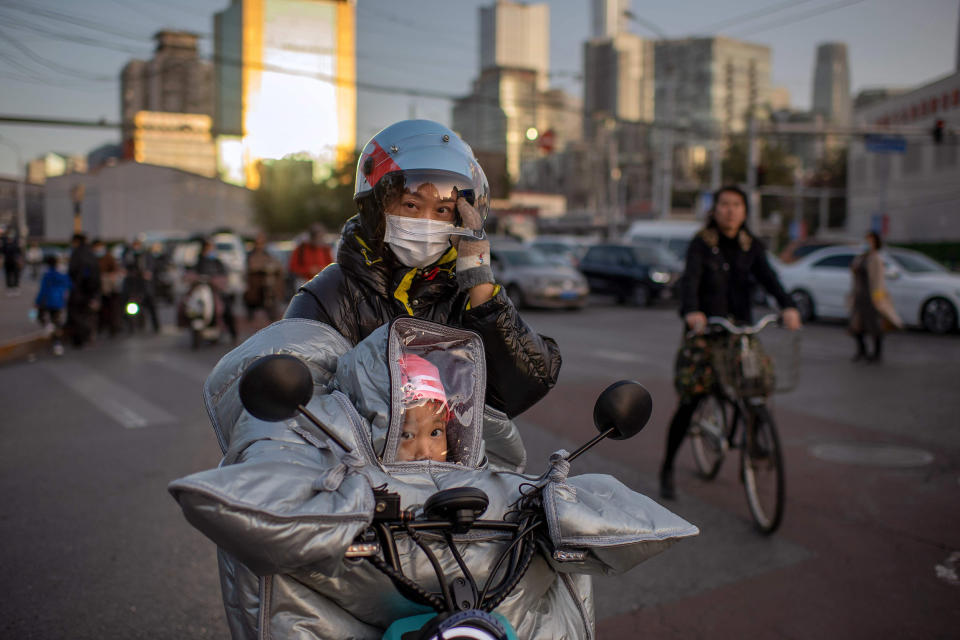As Covid-19 runs riot across the world, China controls the pandemic
Masks, hand sanitizer and temperature checks three times a day.
That's the average day for millions of schoolchildren in China, as the country where Covid-19 was first identified has all but declared victory over the coronavirus.
The strict oversight measures helped more than 240 million students from kindergarten to university return to class in September, according to the county's education ministry.
"For students, they all understand it's the practice we use to keep them safe at school, so they all follow it," said Li Hailong, an English teacher at a primary school in Beijing.
Restrictions in China are similar to those in place throughout Europe and the U.S., but widespread levels of public adherence appear to be making a difference.
Woven into the fabric of everyday life is a system of health codes that assign color-coded designations based on a person's health status. Masks, temperature checks and mass testing are ubiquitous.
The Chinese government has been criticized for its lack of openness and minimizing the severity of the outbreak at its outset. The country has also been accused of mishandling the initial phase of the outbreak and silencing whistleblowers.
President Donald Trump has been one of the most vocal critics, accusing Beijing of early failures that enabled the virus to spread more quickly.

But 10 months after the virus emerged, life is nearing pre-pandemic normality in China, to an extent not seen in most other countries.
"They have done an amazing job of controlling the virus," said Ali Mokdad, a professor of global health at the University of Washington and a former official with the international health program at the Centers for Disease Control and Prevention.
But such success is possible only through restrictions on individual freedoms, he said, that would not be tolerated in the U.S. and other democracies.
In the strict lockdown in Wuhan, the city in central China where the virus first emerged in January, authorities took draconian measures to stop people from entering or leaving.
"Reports indicated very strong compliance with the measures that were required of the people," said David Harper, a senior fellow with the Global Health Program at the London-based think tank Chatham House.
"The system that exists in China allows for this central political directive to be taken through to be implemented with enforcement at the local level in a way that doesn't exist in many other countries around the world," Harper said.
China, a country of 1.4 billion people, has not reported a single Covid-19 death since April 26, according to the country's National Health Commission — the only official source of information about coronavirus infection rates in China. NBC News could not independently verify the reported numbers.
The country has reported 86,212 confirmed cases and 4,634 deaths since the pandemic started. By contrast, nearly 10 million cases and more than 230,000 deaths have been recorded in the U.S. alone, according to NBC News' tally.

Worldwide, the virus has killed more than 1.2 million people, with nearly 50 million confirmed cases, according to John Hopkins University data.
"China is puzzling everybody," Mokdad said, adding that several factors could be in play.
The memory of the 2002 SARS epidemic, which killed nearly 800 people and led to economic damage, made the Chinese more likely to wear masks and socially distance early on during this year's outbreak, he said.
Since the SARS scare, the country has revamped its public health system, said Qifang Bi, a Ph.D. candidate at Johns Hopkins University Bloomberg School of Public Health in Baltimore, who has conducted Covid-19 research in coordination with researchers at the Shenzhen Center for Disease Control and Prevention.
"Although the CDC still faces many challenges, its success in bringing cases down amid a global pandemic does show that the public health system has come a long way since SARS," Bi said.
At the outset of the Covid-19 outbreak in China, she said, an early and strict lockdown in Wuhan played a crucial role in buying other parts of the country precious time to activate their public health responses, preventing a surge of cases.
But most important, Mokdad said, was a government response that involved clear and consistent messages.
"There was a national mandate, and everyone adhered to it," he said.
As Europe and the U.S. continue to face a massive surge of new cases, China has been eager to show off its success in containing the virus.
Beijing's world famous auto show, which was postponed in April, opened its doors in September, becoming the first major auto show to have done so since the pandemic. It was crammed with people, with nearly everyone wearing masks.
In Wuhan, a sports arena that was used as a makeshift hospital at the height of the pandemic hosted a basketball game before 7,500 fans last month, local media reported.

In the country's biggest test yet, more than 600 million Chinese traveled across the country in the first week of October to mark the midautumn festival, a traditional occasion for families to get together and mark the national holiday celebrating the founding of communist China.
As the holiday week wrapped up, the state-run newspaper Global Times reported overcrowded tourist spots and said people were sharing posts about being stuck in traffic jams again — calling congestion "the happiness" that other countries want but "can't have right now."
“Since the outbreak of the epidemic, China has adopted the most comprehensive, strictest and thorough prevention and control measures,” foreign ministry spokesman Wang Wenbin said last week. “Facts have proved that China’s epidemic prevention and control measures are effective," he added.
But China is far from being out of the woods, and the holiday travel was a big test for the country, Mokdad said.
While domestic travel in the first week of October does not appear to have led to any new cases, a cluster of cases was reported in Qingdao, in eastern Shandong province, prompting nearly 11 million residents to be tested. Before cases in Qingdao, China had reported no locally transmitted infections since Aug. 15.
At the end of October, after testing 4.7 million people, authorities placed the far western city of Kashgar into lockdown after a new cluster of cases was discovered.
China is also tightly guarding against the virus's coming from abroad.
On Thursday, it barred non-Chinese travelers from nine countries, including the U.K. and France, as the coronavirus situation continues to deteriorate around the world.
"If they don't maintain the good behavior and start letting down their guard, they will see a surge again," Mokdad said.

